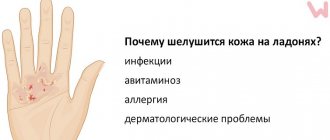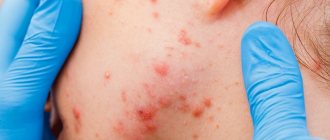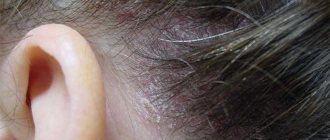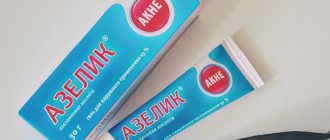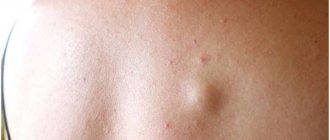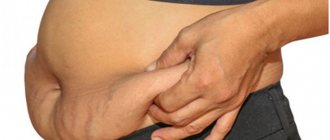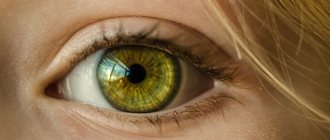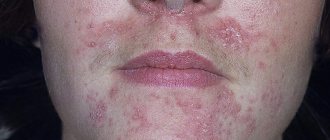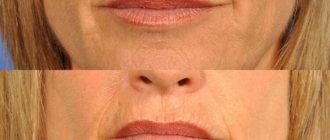Does it often happen that a baby's skin peels?
Let's put it this way: if you find a baby whose skin has never peeled off in the first year of life, you will surprise not only us, but, perhaps, all pediatricians in the world. In most cases, peeling is a completely natural process that is associated with a sharp change in environmental conditions. Sometimes the baby’s skin even peels off; especially problem areas for a newborn are the feet, hands, and head.
Just think about it: over the previous nine months, the child has never encountered a situation where the temperature around him differs from his own. His skin was constantly moisturized and never came into contact with air. Finally, she did not know sunlight and was not exposed to ultraviolet radiation for a second. Now you can imagine the mess your beloved baby got into when he decided to be born 
Typically, a baby's skin will peel because it needs time to adapt to life outside the womb. But there are other factors that lead to this problem.
| Our expert Polina Vasilyeva dermatologist |
| If a newborn's skin peels, this is a physiological phenomenon and is normal. This condition can occur about a day after the birth of the baby and lasts for 3–4 weeks. Despite the fact that this condition is considered normal, it is worth seeing a doctor to rule out congenital ichthyosis and other skin diseases. |
Peeling is normal
The baby is born covered with vernix lubrication, consisting of the secretion of the sebaceous glands and epidermal scales. Scientifically it is called Vernix Caseosa, and is formed at 25-26 weeks of pregnancy. Its function is to protect the baby’s skin from the effects of amniotic fluid. When it goes away, you will notice that the baby's skin has begun to peel off. This is a completely natural process, because throughout your pregnancy the baby lived in amniotic fluid, and now he will have to adapt to a new, “dry” environment.
The intensity of skin exfoliation is individual for each baby, and the process usually takes one to two weeks. No special therapy is required, ordinary gentle procedures for caring for newborns are sufficient, for example, bathing with special products for babies.
Besides this reason, why else does a newborn’s skin peel?
The skin of a baby is very delicate and thin. With the help of peeling, it can indicate a variety of problems - from uncomfortable external conditions that are easy to eliminate, to serious diseases that require competent treatment. We will tell you about the most common problems, but if you have any doubts, we recommend that you consult a doctor.
- Diapers
If ordinary clothing should simply not cause skin problems, diapers must also ensure that these problems do not arise from contact with secretions. Buy only high-quality diapers for newborns and change them at least every 3-4 hours.
Do not forget that even the best diaper will not be able to ensure the absence of flaking and redness if hygiene rules are not followed. When changing a diaper, thoroughly dry the baby's skin, lubricate the folds and let the baby's body breathe for a few minutes.
- Dry air
It is not easy for a baby’s skin to get used to the air, so it is necessary to maintain high humidity in the children’s room - about 50–70%. Buy a hygrometer (a device that measures air humidity) or a weather station with this function. If the device readings are constantly below the recommended level, install a humidifier in the child's room. You can also use traditional methods - wet towels on the radiator, basins of water near the crib, frequent wet cleaning. But with a special device, of course, it is much more convenient: you only need to periodically add water to it, the humidifier will do the rest itself.
Dry air also dries out the mucous membranes of the nose, which can cause breathing and sleep disturbances.
Our expert Polina Vasilyeva
dermatologist
Children's skin contains a large amount of moisture, many times more than that of an adult, but due to a number of physiological characteristics it loses water very easily. Drying out is fraught with the development of various dermatological problems. The baby's skin begins to peel off and becomes very sensitive to various external factors - high and low temperatures, dust, mechanical damage, sunlight and others. - Hygiene products
Some parents take their baby's hygiene very seriously. They buy various gels, shampoos, children's bubble baths and many other bathing products. All later, when the child grows up! At a tender age, these products do not help hygiene, but on the contrary, they can destroy the already fragile natural protection of the skin.
The baby should be bathed in regular tap water. Use shampoo and baby soap no more than once a week, and avoid all other products altogether. Do not add potassium permanganate to the bath - it dries it out and only aggravates the peeling problem.
Our expert Polina Vasilyeva
dermatologist
The child needs to select products specially designed for children’s skin with a good composition (without parabens, sodium lauryl sulfate, fragrances, etc.). - Improper care
The main task of caring for a child's skin is to ensure its hydration. For this, only two products are used - baby cream and baby oil; nothing else should be used. Don’t forget to thoroughly lubricate all the folds on the baby’s body, paying special attention to areas of peeling. And, of course, buy products only from reliable manufacturers and only in reputable stores.
It’s not common, but there are situations when some children’s cosmetics are not suitable for the child. When treating the baby’s skin, parents notice that the problems do not go away or even get worse. In such cases, it is recommended to change the product; in particular, you can try natural “edible” oils - olive, coconut, sesame and others.
Our expert Polina Vasilyeva
dermatologist
To moisturize the skin, it is important to ensure that the baby consumes a sufficient amount of fluid, especially if the body is actively losing it. For example, if a child experiences an intestinal disorder accompanied by vomiting, or has excessive sweating. - Wind, cold, sunlight
Does it ever happen that your face becomes chapped? Have you ever been sunburned? How does your skin feel after a long walk in the cold? Now imagine how all this affects the baby’s skin, which is several times thinner!
To prevent peeling in a newborn, protect exposed parts of his body from wind and direct sunlight. Try not to walk with him in open, windy spaces, choose a shady side of the street, use the stroller hood to protect the baby's skin. Before you start getting your baby ready for a walk in winter, lubricate his face with oil or a special cream. On sunny days, it is recommended to use sunscreen. Make sure the product is absorbed before going outside.
- Food allergies
If a baby's skin is peeling, this may be a manifestation of internal problems in the body, the most common of which is food allergies. At the complementary feeding stage, it is very important to follow the rule of sequential introduction of foods. After you have introduced the baby to a new taste, you need to wait a few days until the next menu expansion and observe possible negative reactions of the body. If you notice that your baby's skin is flaking more than before, it's most likely a new product.
If your baby is currently eating only mother's milk, carefully monitor your diet. Some allergens are able to pass through all the barriers of a woman’s digestive system and enter the milk, and from there into the baby’s body. Is your baby's skin peeling and the situation has suddenly gotten worse? Think about whether you've been on a diet lately.
Our expert Polina Vasilyeva
dermatologist
If the skin dries out due to an allergic reaction, the use of antihistamines is necessary (the specific drug is determined by the doctor). Parents need to ensure that the child does not have contact with the most common allergens - animal hair, dust, pollen, various chemicals, and also temporarily exclude allergenic foods from the diet. - Poor quality clothes
The baby's body is in contact with clothing almost all the time, and this can also be a source of the problem. Artificial fabrics, additives that give the material elasticity, durability and other properties, dyes - all this may not be liked by the skin of a newborn and may result in peeling.
It is advisable that all clothing that directly touches the baby’s body be natural. Buy it only in trusted stores - this guarantees the availability of the necessary hygiene certificates. And learn to confidently refuse an offer from your handicraft grandmother to sew a wonderful overall for your child from your old skirt.
- Detergents
Sometimes there are no harmful substances in the clothes themselves, but they come into them from washing powder, rinse aid, and stain remover. In this case, the baby's skin peels off all of his clothes at once.
If you notice that your problems have gotten worse and you've just recently switched to a new laundry detergent, don't use it anymore. And when buying in a store, choose products that say they are hypoallergenic and suitable for washing children's clothes.
Our expert Polina Vasilyeva
dermatologist
If peeling has already occurred, it is recommended, first of all, to recognize the real cause of its occurrence. If you suspect that peeling could have been caused by household chemicals or personal hygiene products, you need to replace them or eliminate them altogether. - Diapers
If ordinary clothing should simply not cause skin problems, diapers must also ensure that these problems do not arise from contact with secretions. Buy only high-quality diapers for newborns and change them at least every 3-4 hours.
Do not forget that even the best diaper will not be able to ensure the absence of flaking and redness if hygiene rules are not followed. When changing a diaper, thoroughly dry the baby's skin, lubricate the folds and let the baby's body breathe for a few minutes.
- Dry air
It is not easy for a baby’s skin to get used to the air, so it is necessary to maintain high humidity in the children’s room - about 50–70%. Buy a hygrometer (a device that measures air humidity) or a weather station with this function. If the device readings are constantly below the recommended level, install a humidifier in the child's room. You can also use traditional methods - wet towels on the radiator, basins of water near the crib, frequent wet cleaning. But with a special device, of course, it is much more convenient: you only need to periodically add water to it, the humidifier will do the rest itself.
Dry air also dries out the mucous membranes of the nose, which can cause breathing and sleep disturbances.
Our expert Polina Vasilyeva
dermatologist
Children's skin contains a large amount of moisture, many times more than that of an adult, but due to a number of physiological characteristics it loses water very easily. Drying out is fraught with the development of various dermatological problems. The baby's skin begins to peel off and becomes very sensitive to various external factors - high and low temperatures, dust, mechanical damage, sunlight and others.
Should I see a doctor if my newborn's skin is peeling?
In this situation, you need to act the same way as in all others related to the baby’s health: it’s better to play it safe and go to the doctor one more time than to ignore your doubts and start a problem. In addition, there are several alarming symptoms that clearly indicate the need to consult a specialist:
- The baby is growing, but the peeling is not getting smaller.
- The skin began to peel unevenly, and one or more spots appeared on the baby’s body, where the problem manifested itself more acutely.
- The peeling increased sharply, especially if you did not introduce new foods into complementary foods, did not put new clothes on the baby, or changed anything in his life.
- Not only does the baby's skin peel, but there are also other symptoms of skin diseases - red spots or dots, itching, pimples, blisters and others.
| Our expert Polina Vasilyeva dermatologist |
| Initially, the skin of babies is practically never dry due to its saturation with lipids. But they dissolve under the influence of chemicals (which are found in washing powder, soap, and urine), so peeling and inflammation of the skin in babies is quite common. Dry skin can also become due to health problems, and therefore, if there is severe peeling, be sure to consult a doctor. |
Diagnosis of atopic dermatitis in children
For a long time it was believed that atopic dermatitis in children is predominantly an allergic disease. However, it has now been proven that this is, first of all, a disease with dysfunction of the epidermis! And food allergies are detected only in 30-40% of children with atopic dermatitis.
The symptoms of atopic dermatitis are almost always influenced by certain environmental triggers. This could be chlorinated or “hard” water, soap, contact with an allergen, unfavorable climate and even stress. Another common trigger is bacteria that enter the skin through a damaged epidermal barrier.
Only a doctor (pediatrician, dermatologist, allergist) can make a diagnosis of “atopic dermatitis in children”! It takes into account the presence of external signs of disease and itching, as well as hereditary factors. Laboratory tests may be prescribed for children to carry out diagnostics. For example:
- General detailed (clinical) blood test.
- Biochemical general therapeutic blood test.
- General (clinical) urine analysis.
- Study of the level of total immunoglobulin E in the blood.
- Skin testing with allergens.
- Skin biopsy.
What to do if your baby's skin peels?
First of all, do not forget that this is usually a natural developmental stage that the baby will outgrow over time. And take a number of measures to prevent peeling:
- Bathe your child no more than once a day. You can even less often - every other day.
- Use shampoo and baby soap no more than once a week.
- Do not dry your baby's skin after bathing, just pat dry with a towel and then let it air dry.
- After bathing and changing clothes, lubricate the folds on your body with oil.
- Change diapers as needed, but at least every 3-4 hours. After drying your baby's skin, let her breathe for a few minutes.
- Before walking in winter, apply oil to exposed skin; in summer, use sunscreen for children. Allow the product to absorb before going outside.
- Humidify the air in your baby's room.
- Use products designed for washing children's clothing.
- Choose diapers that are gentle on your baby's skin.
| Our expert Polina Vasilyeva dermatologist |
| And remember that the baby does not need to be “bundled up”, even if it seems to you that the room is cool. The accumulation of excess heat leads to sweating. Even if a child feels dry to the touch, this does not mean that his body has stopped evaporating moisture. Overwrapped children sweat, cool down, sweat again, cool down again, and this process leads to decreased immunity and various diseases. In addition, sweat dampens clothing, reducing its heat-protective properties. Therefore, it is necessary to take into account all possible individual characteristics of the child, as well as temporary situational factors that will determine the choice of optimal clothing. |
Authors: Huggies experts, dermatologist Polina Vasilyeva
Peeling - as a result of improper care
Long, frequent bathing, aggressive soap, too warm water - a blow to the protective barrier of the child’s skin. This can often lead to dryness and flaking. There are opinions that the first bathing of the baby should be done with the addition of potassium permanganate to the water in order to disinfect it. So: it’s absolutely not worth doing this. There is no evidence that the method works, but the substance has a negative effect on the skin of a child.
According to the recommendations of the Union of Pediatricians of Russia, the water temperature for baths should be at 36.5-37.5 °C. Newborns do not need daily bathing; regular hygiene procedures and 2-3 baths per week are recommended.
